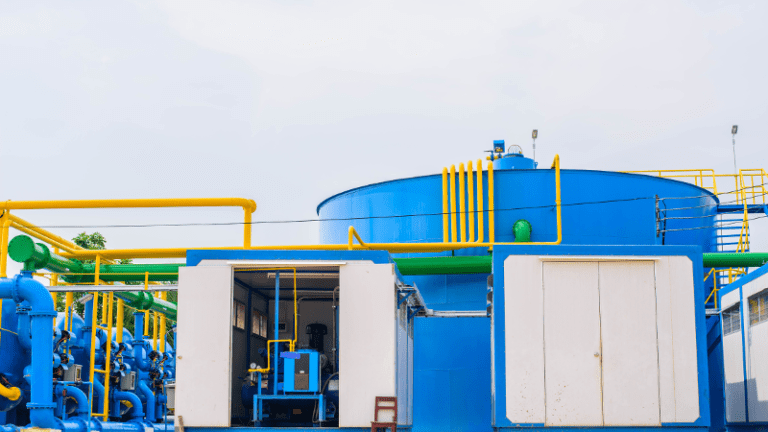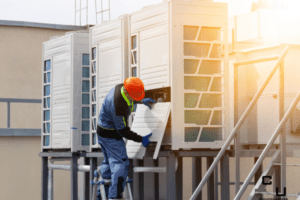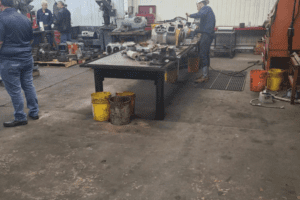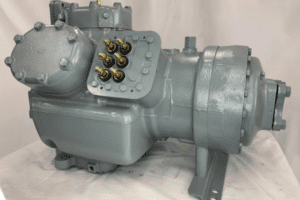In many commercial and industrial workplaces, you can go your entire career without ever seeing a large industrial chiller. Yet, glycol chillers are crucial in all sorts of specialized applications, especially related to food preparation. Food-grade propylene glycol can be used for cooling applications in close proximity to food products. For example, distilleries and wineries use glycol chillers almost exclusively.
Naturally, all equipment requires some kind of periodic maintenance. If you’re not careful, however, the needs of an industrial chiller could catch you by surprise. Basic maintenance can be broken down into weekly, monthly, quarterly, and annual activities, with a daily visual check to ensure the unit is clean and in working order. Once you get used to it, it can all be much easier than it looks at first.
Let’s consider some of the basic maintenance your chiller needs regularly:
1. Check Glycol Pressure
Glycol pressure is often the first thing to suffer when there’s a mechanical problem with your chiller. Check your glycol pressure gauge regularly and make sure you know what the normal level is for your system. When the pressure dives, it indicates a plumbing problem somewhere in the chiller or a low level of glycol. Like low refrigerant levels in other systems, it’s one of the most common issues.
2. Check Glycol Levels in the Reservoir
Most glycol chillers are designed so you can measure the level of glycol in the tank at a glance using the external sight tube. Low glycol levels can cause damage throughout the entire system! If the sight glass level falls below the minimum indicated by the markings, top off your glycol levels immediately. Otherwise, you could damage the compressor, which is usually integrated with the chiller.
3. Verify Your Glycol Mixture
The cooling function in a glycol chiller isn’t provided by pure glycol, but instead by a mixture of water and glycol. Keep a refractometer handy to do this regular check. The glycol must be kept at a 26.5 brix mixture at all times for predictable performance. This works out to 35% propylene glycol to 65% water. Glycol mixture should be verified any time you’ve had to correct low glycol levels or low pressure.
4. Check for Flattened or Bent Fins
If you are using an air-cooled chiller, you’ll need to ensure healthy airflow at all times while the system is in operation. The condenser can severely restrict airflow if any fins become flattened or bent. At the same time, even a tiny amount of debris can wreak havoc. Keep vegetation away from the chiller and check for dirt, leaves, and spent grain regularly. Listen carefully for any unusual sounds from the chiller.
5. Maintain the Cooling Tower
For a water-cooled chiller, you’ll want to clean and inspect the cooling tower regularly. Water-cooled systems are especially precarious for wineries and distilleries because they can foster the growth of bacteria or even algae. As the tower becomes less efficient, any type of outside growth can hinder heat rejection and ultimately lead to the entire system suffering the effects of overheating.
6. Perform a Full Visual Inspection
A quick visual inspection can be finished in just a few seconds, but a full inspection should be more thorough. Check on the oil-level sight glass to make sure it is at least half full – below that level, damage is possible. Also, check in and around the chiller for any signs of leaks. If you notice damaged insulation, repair it as soon as possible to maintain optimal heat transfer efficiency.
7. Clean and Lubricate Key Parts
In a glycol chiller, you will need to regularly clean both the heat exchangers or evaporator coils as well as the condenser, if one is used. Motors, pumps, and other moving parts should be lubricated regularly to extend their working life. And, of course, directly inspect the compressor unit for unusual noises, vibration, and signs of wear. Change the oil or filters as needed.
When you follow a thorough maintenance routine and document any repairs or replacements you perform, you are much more likely to keep your industrial chiller working strong for years to come.
Bring Your Industrial Chiller Back to Life with a Remanufactured Industrial Compressor
With appropriate maintenance, the service life of a large industrial glycol chiller can range anywhere from 15 to 25 years. As amazing as that is, several of the major components will need to be replaced during that time. The most important of all is the industrial compressor.
When you need a clear path to replace your compressor at the lowest cost and highest quality, a remanufactured industrial compressor is the answer. Using your existing compressor core, the remanufactured compressor is engineered to meet all of the original performance and environmental standards, and can often be delivered in weeks.












